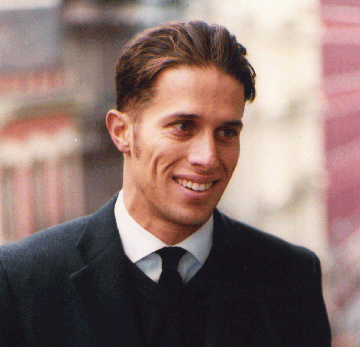|
Web
Exclusives:Features December
19, 2001: Photo by: J. Andrew Hallowell © 2000 Graham Burnett '93 is a Princeton professor because of a course his father David '66 chose for him in 1989. That fall, Graham was recovering from viral meningitis, so his father selected his first-semester courses, including Michael Mahoney's survey of the Scientific Revolution. Three weeks into the term, Burnett walked into Mahoney's office and asked how he might go about becoming a historian of science. "I was first attracted by the question of how a European worldview once so dominated by theology was largely displaced," Burnett says. Referring to the chaotic nature of early modern science, he added "How did this mish-mash of mathematics, epistemological musings, and parlor tricks become such a powerful way of explaining reality?" Mahoney was impressed, and he suggested that Burnett perform one of the parlor tricks. "Take Rene Descartes's description of his lens-grinding machine and make a model of it, and maybe you'll learn something," Mahoney remembers advising Burnett. The model still sits in Mahoney's office. Burnett wrote his thesis on the topic. As a Marshall scholar at Cambridge University, Burnett turned his attention to the history of exploration. "I think this was a natural extension of my earlier interest in the relationship between the ërise' of science and the ëdecline' of certain theological systems," Burnett says. "I decided that if I wanted to understand how science could effect such powerful changes, then the areas of contact between European scientific explorers and other peoples might serve as significant places to watch this happen." The peripatetic scholar chose his field of inquiry for another reason, he says. "By this point I had traveled a good deal in India, North Africa, Central America, and the Caribbean, and I wanted my academic work to connect to this wider world I was seeing." Burnett earned his Ph.D. at Cambridge and published his thesis, "Masters of All They Surveyed: Exploration, Geography, and a British El Dorado," in which he details the efforts of a 19th-century British explorer to map what became British Guyana. Burnett's second book stems from a more personal experience. While living in New York City, he was selected to be the foreman on a murder trial. The case lasted two weeks, and the jury deliberated for four days before finding the accused innocent. "No experience I've had, with the possible exception of marriage, has drawn so deeply on both my intellectual and emotional resources," Burnett says. "We usually think of those realms, wrongly, as fundamentally distinct. This combination of intense thinking and intense feeling was very dramatic for me." "The experience forced me to acknowledge the limits of my humanistic training. Humanists are good at talking, at keeping questions alive and open, but what the polity asks of a juror is radically different. Yes, a juror has to think carefully and converse reflectively — inquire into human matters in a community of inquiry, just like a humanist — but then the jury closes the question, answers it, definitively. This was very hard for me to face." His book about the experience, "A Trial By Jury," was published in September by Knopf. The same month, Burnett began work as an assistant professor in Princeton's history department and is teaching Science Overseas: Knowledge and Exploration in the 18th and 19th Centuries this fall and precepting The World and the West. In the spring he'll teach Science in the Modern World. He's also about to finish the assignment Mahoney gave him 12 years ago: the erstwhile student hopes to publish a monograph on 17th-century lens grinding next year.
|

 By
David Marcus '92
By
David Marcus '92